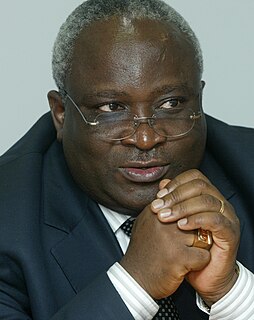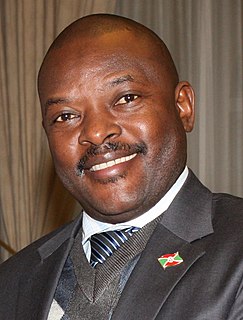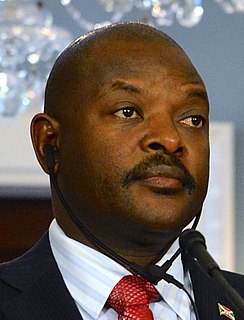
The Politics of Burundi takes place in a framework of a transitional presidential representative democratic republic,whereby the President of Burundi is both head of state and head of government,and of a multi-party system. Executive power is exercised by the government. Legislative power is vested in both the government and the two chambers of parliament,the Senate and the National Assembly.

Cyprien Ntaryamira was a Burundian politician who served as President of Burundi from 5 February 1994 until his death two months later. A Hutu born in Burundi,Ntaryamira studied there before fleeing to Rwanda to avoid ethnic violence and complete his education. Active in a Burundian student movement,he cofounded the socialist Burundi Workers' Party and earned an agricultural degree. In 1983 he returned to Burundi and worked agricultural jobs,though he was briefly detained as a political prisoner. In 1986 he cofounded the Front for Democracy in Burundi (FRODEBU),and in 1993 FRODEBU won Burundi's general elections. He subsequently became the Minister of Agriculture and Animal Husbandry on 10 July,but in October Tutsi soldiers killed the president and other top officials in an attempted coup.

The president of Burundi,officially the President of the Republic,is the head of state and head of government of the Republic of Burundi. The president is also commander-in-chief of the National Defence Force. The office of the presidency was established when Michel Micombero declared Burundi a republic on 28 November 1966. The first constitution to specify the powers and duties of the president was the constitution of 1974 adopted in 1976. The constitution,written by Micombero,affirmed Micombero's position as the first president of Burundi. The powers of the president currently derive from the 2005 constitution implemented as a result of the 2000 Arusha Accords after the Burundian Civil War. The current president since 18 June 2020 is Évariste Ndayishimiye.

Domitien Ndayizeye is a Burundian politician who was President of Burundi from 2003 to 2005. He succeeded Pierre Buyoya,as president on 30 April 2003,after serving as Buyoya's vice president for 18 months. Ndayizeye remained in office until succeeded by Pierre Nkurunziza on 26 August 2005.

Pierre Buyoya was a Burundian army officer and politician who served two terms as President of Burundi in 1987 to 1993 and 1996 to 2003 as de facto military dictator. He was the second-longest serving president in Burundian history.

Pierre Nkurunziza was a Burundian politician who served as the ninth president of Burundi for almost 15 years from August 2005 until his death in June 2020. A member of the Hutu ethnic group,Nkurunziza taught physical education before becoming involved in politics during the Burundian Civil War as part of the rebel National Council for the Defense of Democracy –Forces for the Defense of Democracy of which he became leader in 2000. The CNDD–FDD became a political party at the end of the Civil War and Nkurunziza was elected president. He held the post controversially for three terms,sparking significant public unrest in 2015. He announced his intention not to stand for re-election in 2020 and instead ceded power to Évariste Ndayishimiye,whose candidacy he had endorsed. He died on 8 June 2020 shortly before the official end of his term. He was the longest-ruling president in Burundian history.

Burundi,officially the Republic of Burundi,is a landlocked country in the Great Rift Valley where the African Great Lakes region and East Africa converge. It is bordered by Rwanda to the north,Tanzania to the east and southeast,and the Democratic Republic of the Congo to the west;Lake Tanganyika lies along its southwestern border. The capital cities are Gitega and Bujumbura,the latter of which is the country's largest city.
Thérence Sinunguruza was a Burundian Tutsi politician and active member of Union for National Progress (UPRONA),who served as First Vice President of Burundi,in charge of political,administrative and security matters,from 2010 to October 2013,when he resigned. Previously he was a Member of Parliament from 2005 to 2010. Sinunguruza held various ministerial positions,including Minister of Institutional Reforms from 1994 to 1996,Minister of Justice from 1997 to 2001 and Minister of Foreign Affairs from 2001 to 2005. He was Burundian Permanent Representative to the United Nations in New York from 1993 to 1994.

Presidential elections were held in Burundi on 21 July 2015. President Pierre Nkurunziza ran for a third term despite controversy over whether he was eligible to run again. The opposition boycotted the vote,and Nkurunziza won re-election.

On 25 April 2015,the ruling political party in Burundi,the National Council for the Defense of Democracy –Forces for the Defense of Democracy (CNDD-FDD),announced that the incumbent President of Burundi,Pierre Nkurunziza,would run for a third term in the 2015 presidential election. The announcement sparked protests by those opposed to Nkurunziza seeking a third term in office.
This article lists events from the year 2015 in the Republic of Burundi.
This article lists events from the year 2017 in Burundi.

Burundi–India relations refers to the international relations that exist between Burundi and India. Apart from bilateral relations,India also engages with Burundi through the African Union and the Regional Economic Communities (RECs).

General elections were held in Burundi on 20 May 2020 to elect both the president and the National Assembly. Évariste Ndayishimiye of the ruling CNDD–FDD was elected president with 71% of the vote. In the National Assembly elections,the CNDD–FDD won 72 of the 100 elected seats.

General Évariste Ndayishimiye is a Burundian politician who has served as President of Burundi since 18 June 2020. He became involved in the rebel National Council for the Defense of Democracy –Forces for the Defense of Democracy during the Burundian Civil War and rose up the ranks of its militia. At the end of the conflict,he entered the Burundian Army and held a number of political offices under the auspices of President Pierre Nkurunziza. Nkurunziza endorsed Ndayishimiye as his successor ahead of the 2020 elections which he won with a large majority.
Joseph Butore is a Burundian politician who served as Second Vice President of Burundi from 2015 to 2020. He was born in Cibitoke,Burundi in 1969. He was initially elected as a deputy of the Cibitoke constituency in 2010 and was appointed by President Pierre Nkurunziza as Minister of Higher Education and Scientific Research in 2013. In 2015,he was appointed Second Vice President.

Alain-Guillaume Bunyoni is a Burundian politician who has been Prime Minister of Burundi since 23 June 2020. Before that,from 2015 until 2020,he served as Minister of Internal Security in the Cabinet of Burundi.

Prosper Bazombanza is a Burundian politician serving as Vice President of Burundi since 23 June 2020. He was appointed to the position by newly elected president Évariste Ndayishimiye. He previously also served as First Vice President from 2014 to 2015.












